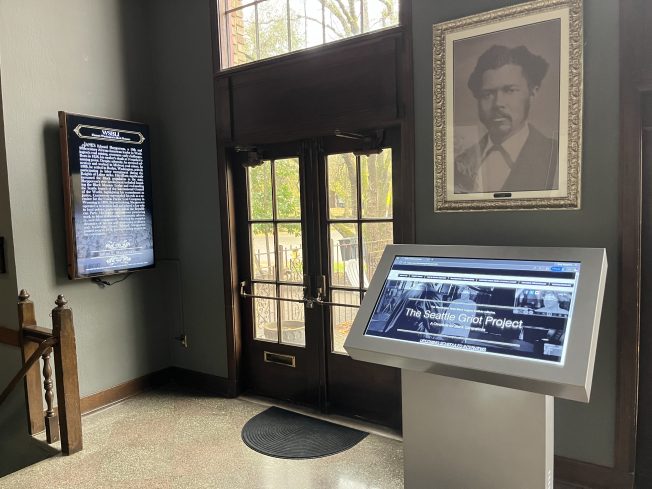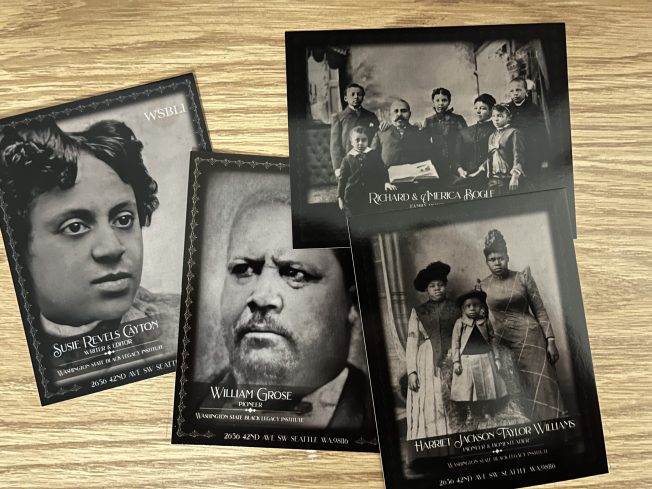 (WSB photo: WSBLI foyer display)
(WSB photo: WSBLI foyer display)
By Anne Higuera
Reporting for West Seattle Blog
The Washington State Black Legacy Institute opened in the Admiral District early this year with an ambitious set of goals around community engagement and making information about local Black history easily accessible. With a fundraiser scheduled next week, we checked in with WSBLI’s historian and vice president, Roger Evans, to find out how 2025 has gone and what’s new in the coming year.
This year started with plans to keep the institute exhibits, at 2656 42nd Ave SW, open to the public for the full month of February, Black History Month. Evans says that month went well, and yielded valuable information about the high cost of staffing and heating the building (a city landmark that originally was a church) when open regularly. With a limited budget, they decided to open the building to tours only when asked, with some larger groups visiting through the Southwest Seattle Historical Society‘s Log House Museum. Regular hours are a goal for the future, and until then, “If someone calls us, we’ll do a tour,” he says, adding it will be “by appointment only until we can afford to do something more.”
In addition to welcoming visitors, WSBLI has been doing outreach to schools, community centers, and other locations, bringing informational banners and videotaped interviews. For visitors and school kids, they’ve printed trading-card-style postcards, with photos on one side and a short history on the other.
Each card features Black Washingtonians from the late 1800s and early 1900s, among them, pioneers, entrepreneurs, and newspaper publishers. Evans says there are 11 cards, so students in a classroom can swap them to learn about each of the featured people.
One of the primary goals of the institute is to gather information, digitize it, and make it available to the public, whether it be through tours, virtual reality exhibits, or videos and stories viewed online. Evans is most excited about a new internship program planned for 2026 that will move that goal forward: the Black Cultural Archivist and Storytellers Fellowship. Drawing on students from Seattle and nearby cities, the Fellowship will offer a 3-part educational program, covering skills in audio, video, and journalism. Participants will earn a stipend for ompletion of each 16-week after-school program, which will take place at WSBLI.
Evans says the Fellowship is designed to run for at least 3 years. “It kind of evolved from what we do daily, things that we do in fragments. We turned it into something that was tangible for journalists or ones who want to do preservation … and it will really engage the young folks.” Interns will learn the basics of journalism, podcasting and audio editing, and how to shoot and edit video. “We don’t really want them to write the story, we want them to pull the story out of the interviewee, the person who lived it.” Look for more information about the fellowship program on the WSBLI website in the coming months.
Of course, all of these efforts require funding in the form of grants or donations. WSBLI is planning to transition to nonprofit status in 2026. To date, they’ve accepted donations through their parent organization, The Seattle Griot Project, which in turn is fiscally sponsored by the nonprofit Shunpike, which is able to accept tax-deductible donations on their behalf.
In order to introduce donors to the fellowship program and other efforts, the Institute is opening its doors this Thursday, November 20, for an evening event, the “Legacy of Learning: Building Futures Together Fundraiser.” In between dinner and drinks, they’ll be sharing their achievements and asking for support for new projects. The event takes place from 6-8 pm at WSBLI (check here for ticket availability). For more information, call 206-730-8065 or email wsblacklegacyinstitute@gmail.com


| Comments Off on FOLLOWUP: Washington State Black Legacy Institute looks ahead to next year – and to fundraiser next week